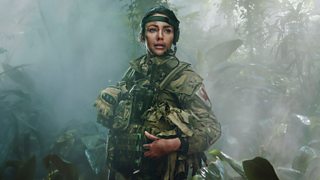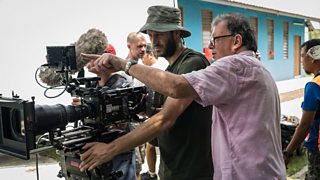
It was back in mid-July 2017 that Tony Grounds the lead writer and creator of Our Girl talked about where to set the last four episodes of the current series.
We had already committed to shooting in Malaysia for the Belizean jungle episodes and as moving a film unit around the world is both complicated and expensive, we wanted to find another setting for a story where we could also film in Malaysia. For those that haven’t seen the Malaysian peninsula is an incredibly verdant and mountainous region, the archetypal tropical setting. I remember saying to Tony that there’s the tropic of cancer and the tropic of Capricorn, draw a line along both these on a map of the world and set your story anywhere inside them, where the British army could believably be posted, and we should probably be able to match it.
It didn’t take Tony long to come up with Bangladesh. He’d picked up on stories about Rohingya Muslims crossing the border from Myanmar and living in refugee camps. This, incidentally was over a month before the story became major headline news in late August. He decided that Georgie and 2-Section could be posted here to help with the relief efforts and that we could tell a story that could help draw attention to the problem. Tony and I also watched a Vice News documentary about the trade and use of yaba, a methamphetamine drug that is ruining the lives of many in that country. So, with this setting as a back-drop Tony set out to tell a story about how hard it is to do good in an environment where there is so much corruption and intimidation from drug lords.
From a production point of view Malaysia suited us well for a Bangladesh setting. A huge part of the population of the country are of Indian descent which made finding actors and extras a lot easier and the fauna matched perfectly. There’s even a vibrant Little India neighbourhood in the centre of Kuala Lumpur which we used several times on the shoot. There was however the problem of the Naf river. This forms part of the border between Bangladesh and Myanmar and the director, Brian Grant wanted to shoot a scene where we saw the refugees crossing the river. By this time the story was everywhere and the image of the Rohingya crossing the river was becoming iconic. It’s a very wide river and there’s nothing like in Malaysia. We had however shot on the coast some weeks back for a different episode and someone remembered that a little further down from where we’d been there was an inlet that when the tide was out could be shot in a way that it would look like the two banks of a wide river. This was perfect for us as it was incredibly shallow and with no current making incredibly safe to shoot there.
Then, when we were scouting for extras to play the Rohingya we were told that there was a community of Rohingya Muslims living in Kuala Lumpur. They were former refugees that have been allowed to settle in Malaysia and they were interested in taking part. Brian Grant went to meet them and talk them through what we needed. I’ll let him pick up the story here...

Director Brian Grant with the production crew behind the scenes on series 3
Brian Grant says: "After reading Tony’s script I did some research and watched a lot of documentaries about the unfolding events in Myanmar. Hundreds of Rohingya have died crossing the border into Bangladesh. Some have been attacked. Others have stepped on landmines and many have drowned.
"I watched one news clip showing thousands of refugees, crossing the Naf River into Bangladesh and found it quite overwhelming. Human misery on a biblical scale. I felt if we could re-create this in the most realistic way, it would give a real weight to the story Tony had written.
"Hiring professional extras to re-create an event in a film is one thing but asking ordinary people to relive one of the worst events in their lives is another. So, I asked the casting people to arrange for me to meet them. I sat with the Rohingya's and explained exactly what we were trying to do. I thought it was important they understood what was involved, as I realised that this might be very difficult for them emotionally. With this detailed knowledge they could then make an informed decision and decide whether to take part or not. They all wanted to take part.
"On the day they were remarkable. Carrying their children and what few belongings they would have had, they relived it for our cameras. It was astonishing to witness and in helping to recreate an event from what is one of the most profound human tragedies of the 21st century, this small Rohingya community demonstrated the most remarkable thing. Their dignity."
Our Girl continues tomorrow night on 主播大秀 One at 9pm. Watch the first episode of the Nigeria Tour now on 主播大秀iPlayer.
